Subject: Language and Literature Studies (na tle tradycji leksykograficznej) / Wybór formy hasłowej jako problem opisu w (na tle tradycji leksykograficznej) Author(s): Renata
Subject: Language and Literature Studies
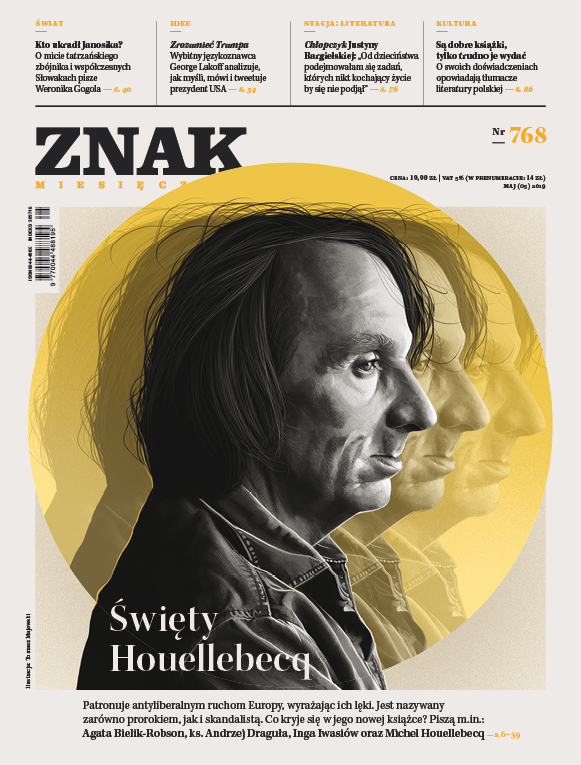
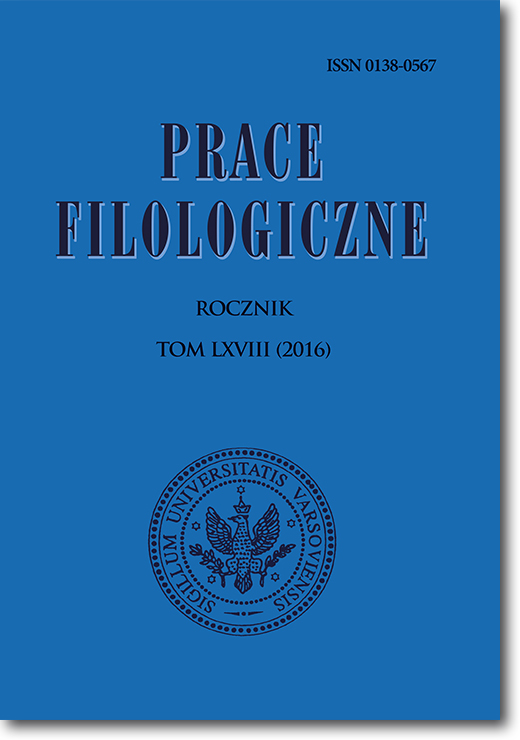
Wybór formy hasłowej jako problem opisu w (na tle tradycji leksykograficznej)
Author(s): Renata Bronikowska / Language(s): Polish / Issue: 68/2016
The article is devoted to problems with choosing the form that would represent a particular lexeme in an entry, as faced by lexicographers working on
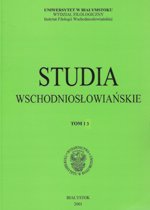
Wybór kierunków studiów przez uczestników Olimpiady Języka Rosyjskiego
Author(s): Karolczuk Marzanna / Language(s): Polish / Issue: 14/2014
The purpose of this article is to present the conclusions of the analysis of the Survey of the Russian Language Olympiad participants about the planned areas of studies by high school students and about the schools which support the development of students in terms of their abilities and interests. The research has shown that every third participant in the regional qualification for the Russian Language Olympiad would have opted for language studies. There is a noticeable downward trend, however, in the choice of philological studies within three years. Students from 37 schools in the Podlaskie Voivodship qualified for the second level of the Russian Language Olympiad, among them there were 61% of students representing schools outside of Białystok.
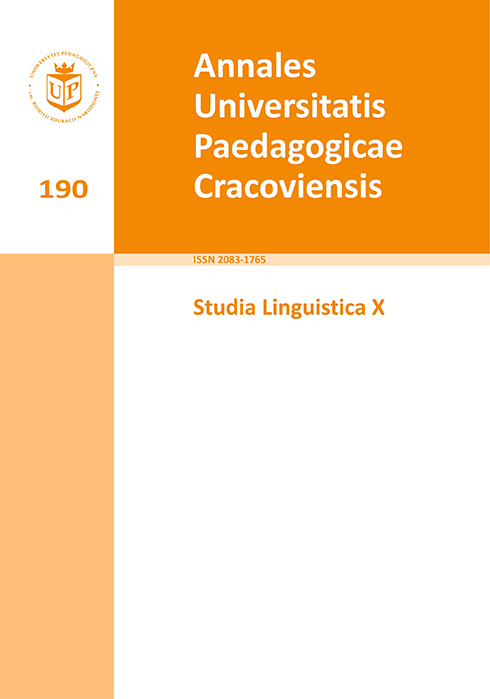
Wybór tekstów z dziejów języka polskiego. Do polowy XIX w., t. 1, red. Marek Cybulski, Łódź: Wydawnictwo Uniwersytetu Łódzkiego, 2015, 630 s. Wybór tekstów z dziejów języka polskiego. Od polowy XIX w., t. 2.
Author(s): Marceli Olma / Language(s): Polish / Issue: 10/2015
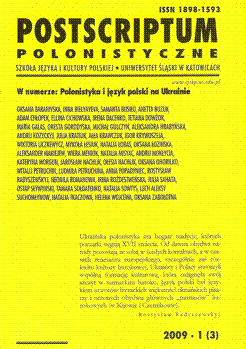
Wybrane osobliwości składniowe tekstów lwowskiej prasy polskojęzycznej. Na materiale Gazety Lwowskiej
Author(s): Oksana Ohorilko / Language(s): Polish / Issue: 1/2009
The article investigates some syntactic peculiarities of texts in the Polish language in Lviv Newspaper “Gazeta Lwowska” and syntactic peculiarities of Lviv Polish language which concern the use of conjunctions and word order in a sentence are considered.
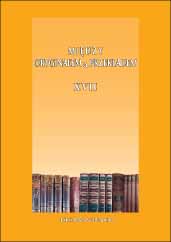
Wybrane parateksty obcojęzycznych wydań poezji Bolesława Leśmiana
Author(s): Marta Kaźmierczak / Language(s): Polish / Issue: 17/2011
The paper is devoted to investigating chosen types of the paratexts present in the foreign-language (English, Russian, Czech and German) editions of Bolesław Leśmian’s poetry. Titles of the books are examined from the perspective of the functions that they should perform – identifying, persuasive, informative about the content and poetics, marking the translators’ strategy. The titles of lyric cycles are checked for their congruence (intertextual link) with the texts of the poems from which they derive. The last element discussed are dedications. Their presence or absence in the foreign editions of Leśmian’s oeuvre is analyzed from the point of view of relevance – both for the poet and the poems and for the foreign reader.
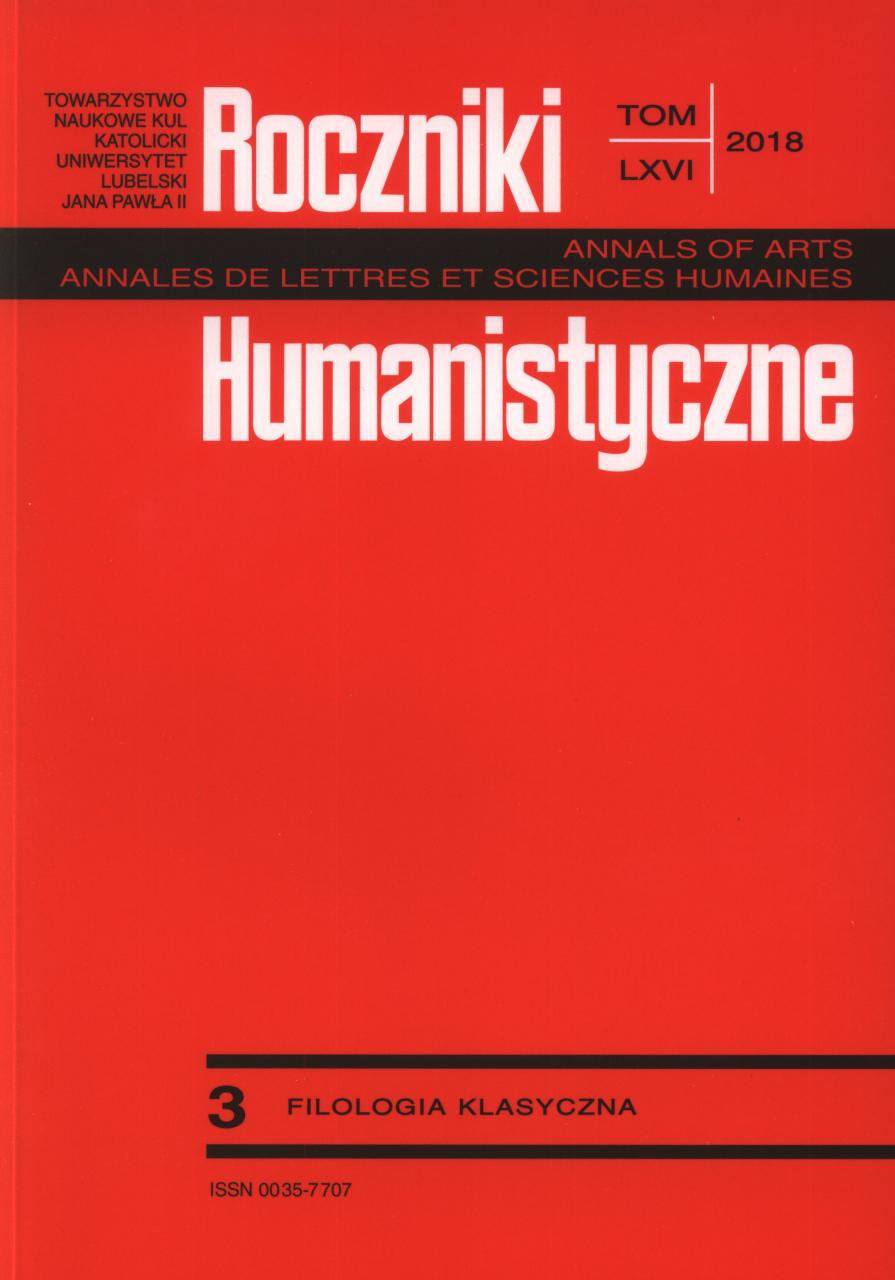
Wybrane passusy dotyczące laktacji w Dionysiaka Nonnosa z Panopolis w świetle współczesnej wiedzy medycznej
Author(s): Anna Maria Lasek / Language(s): Polish / Issue: 3/2018
The Dionysiaca by Nonnos of Panopolis is the most ample extant epos of ancient Greek literature (consisting of 48 books). Besides very frequent allusions and references to ancient Greek and even Latin literature, in Nonnos' epos there can be found hints of medical knowledge such as: methods of medical treatment (especially of warriors' injuries), and the symptoms of pathological conditions, diseases and disorders. The epos also mentions many human physiological phenomena and processes such as: descriptions relating to the physiological characteristics of old age, birth, and breastfeeding. The aim of this article is to present a wide range of issues connected with human lactation as depicted in the Dionysiaca of Nonnos in the light of modern medical knowledge. The presentation of passages concerning lactation includes the most common form of breastfeeding post-partum, and wet-nursing, as well as the rare, but possible, non-puerperal lactation. The description of male lactation is the last of these phenomena.These scenes of breastfeeding seem to serve both to prove the broad medical knowledge of the author as well as to fulfil the literary principle of variety (varietas).
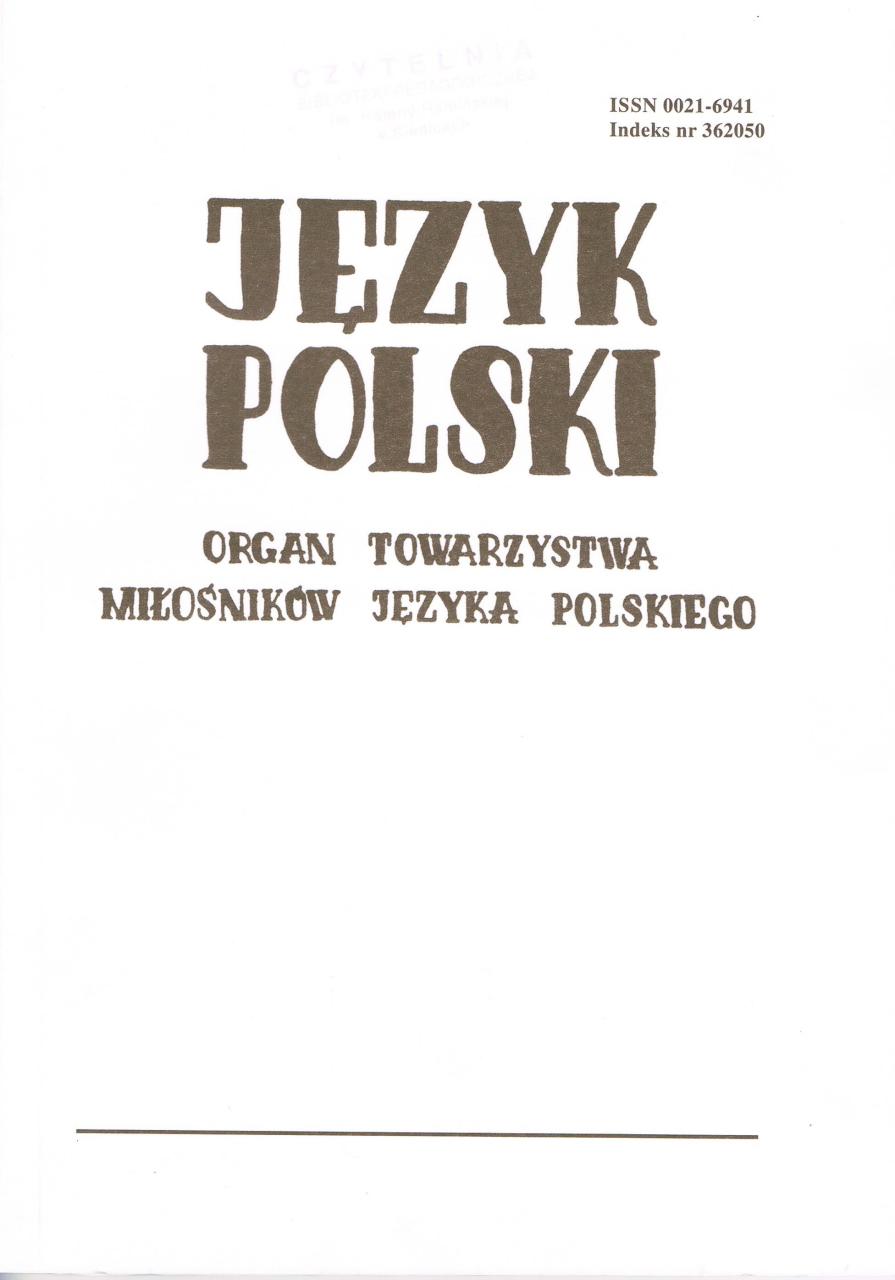
Wybrane problemy definiowania nazw roślin w Nowym słowniku języka polskiego pod redakcją Tadeusza Lehra-Spławińskiego
Author(s): Ewa Hantulik / Language(s): Polish / Issue: 5/2011
The main problem is the analysis of strategy of defining names of plants in the New Dictionary of Polish edited by T. Lehr-Spławiński. Using contemporary research methods connected with the lexical semantics and the theory of lexicology the author presents the most common types of definitions. She divides the lexemes first of all in respect of the hyperonims used in the definitions and then on the basis of the constructions that were used by the editors in making the definitions. The author also shows the most common errors and mistakes made in defining the meaning in the dictionary.
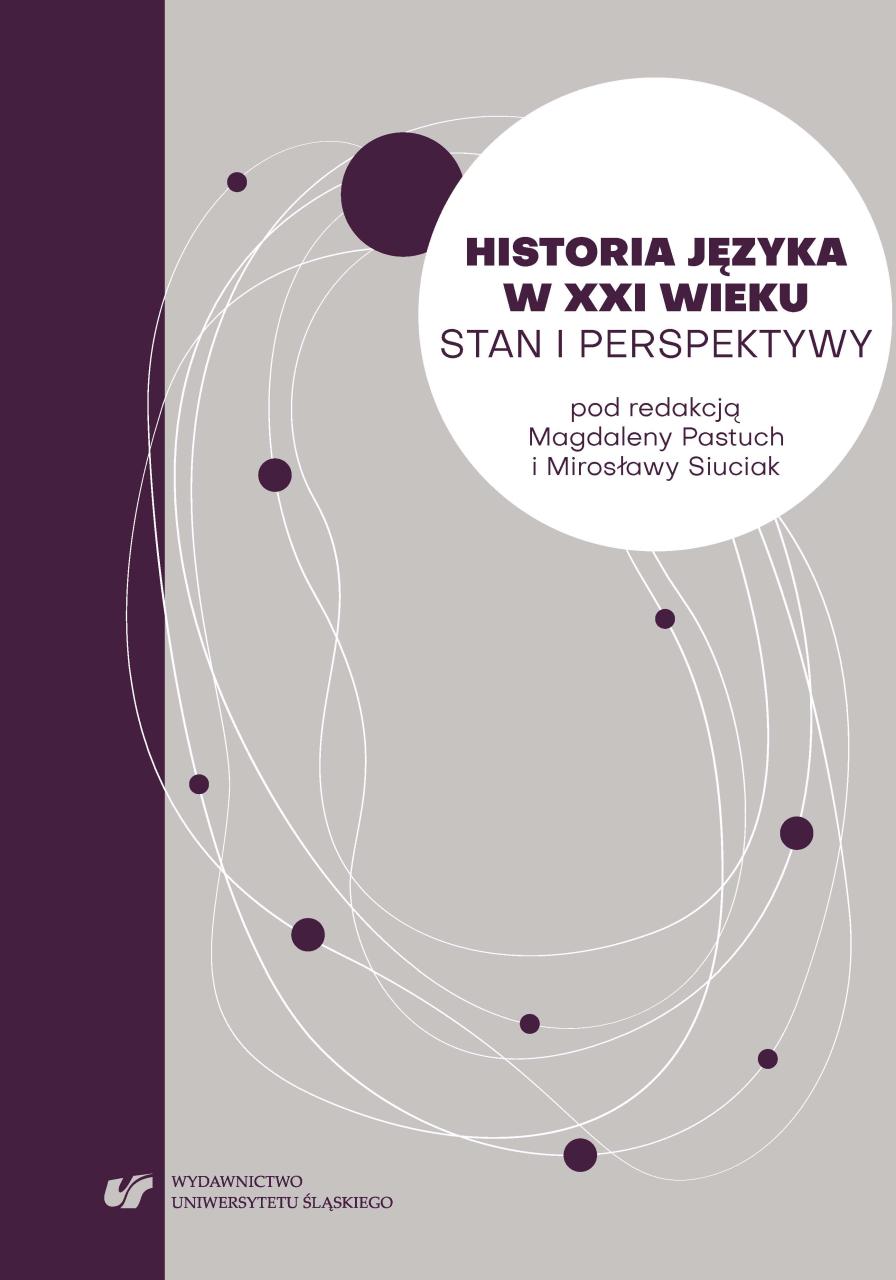
Wybrane problemy semantyki historycznej. Definiowanie znaczeń w słowniku dawnej polszczyzny
Author(s): Włodzimierz Gruszczyński,Dorota Adamiec,Magdalena Majdak,Wiesław Morawski / Language(s): Polish / Publication Year: 0
The authors deal with the problem of reconstructing and defining the meanings of old lexical units in historical dictionaries. Those should be treated as bilingual since the language of a past epoch is nowadays extinct and foreign. Defining the meanings of old lexical units, should the lexicographer try to reconstruct the state of science of that time or refer to his present-day language competence? The authors, by means of numerous examples, present detailed problems with reconstruction of meanings, caused by difficulties with categorization of designs. The conclusion is that definitions should comprise all the features of a designation appearing in historical language material.
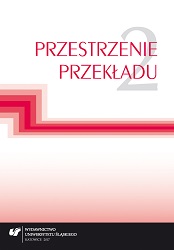
Wybrane problemy translacyjne w tekstach cywilnoprawnych (konfrontacja słowacko-polska)
Author(s): Mariola Szymczak Rozlach / Language(s): Polish / Publication Year: 0
The purpose of this article is to indicate problems resulting from translation of specialist civil law texts from Slovak into English. Research material consists of translations made by students of the Slavic studies. The author analyzes issues related to translation strategies, translator’s errors and language errors with particular focus on legal and administrative terminology as well as the specificity of specialized translation. Genetic closeness of both languages causes not only strong interference but also problems stemming from discrepancies between legal systems of the analyzed languages.
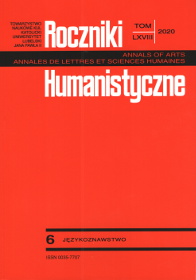
Wybrane problemy wczesnej komunikacji pastoralnej ks. Karola Wojtyły na przykładzie cyklu wykładów Rozważania o istocie człowieka
Author(s): Arkadiusz Dudziak / Language(s): Polish / Issue: 6/2020
The topic of the article concerns the early pastoral communication of Fr. Karol Wojtyla. The subject of the research is a series of philosophical and theological lectures “Considerations about the Essence of Man”, which Fr. Wojtyła delivered in 1949 in the parish of St. Florian in Krakow. Thematically and methodologically, the arguments fit into the paradigm of social communication science. In the research process of communicated content, the method of linguistic analysis and the method of rhetorical analysis were used. The aim of the study is to show the rhetorical values and persuasive features of the communicating of Fr. Wojtyla.
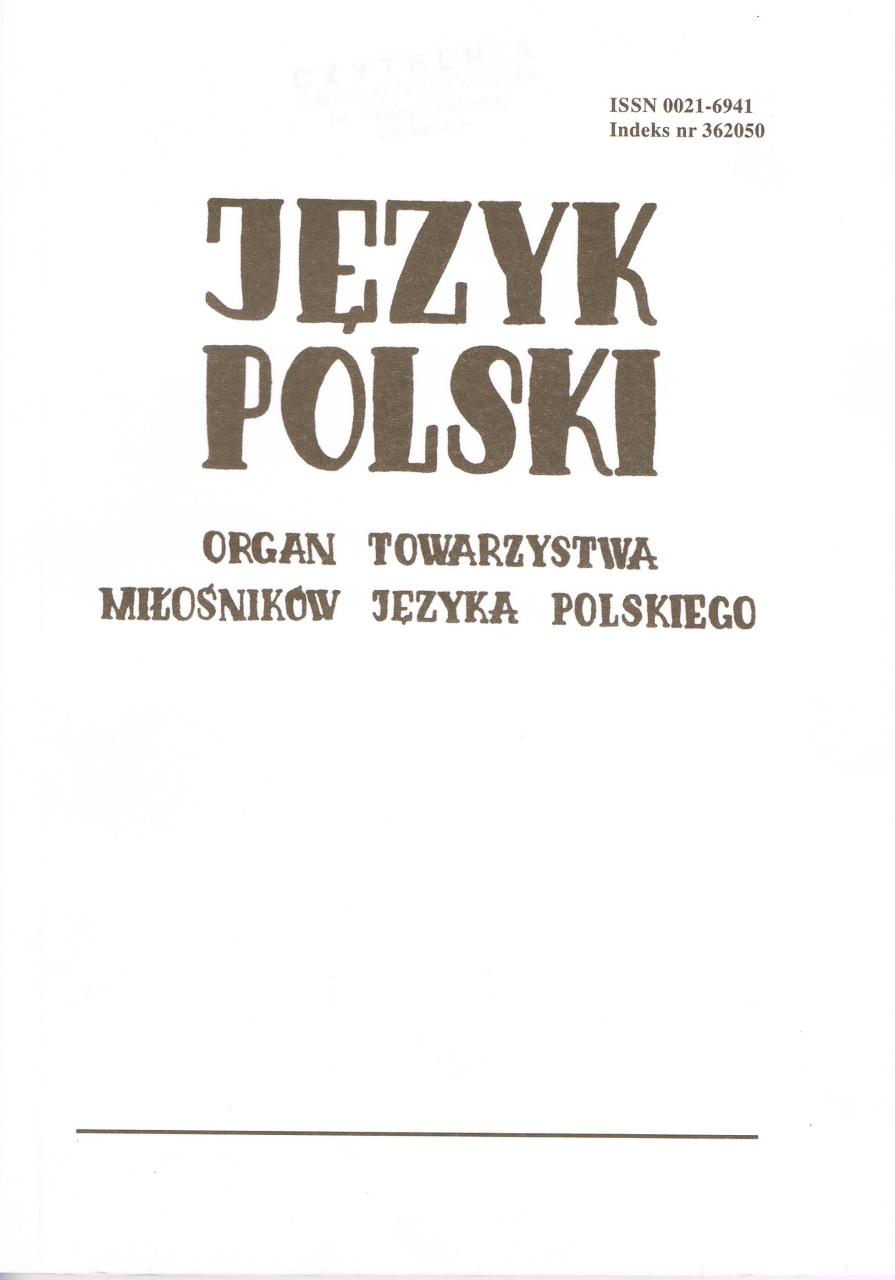
Wybrane regionalizmy Krakowskie w mowie mieszkańców Zawiercia
Author(s): Anna Wojciechowska / Language(s): Polish / Issue: 2/2012
The purpose of this article is exploring the lexical connections between Cracow and Zawiercie. A list of words and expressions specific to Cracow inhabitants has been prepared, based on various sources: articles, dictionaries and web site materials. Zawiercie region-specific words, used for comparative research, were compiled in 2006 and 2007 by using a questionnaire developed under the supervision of Professor Bogusław Dunaj. The article aims at presenting the chosen Cracow-specific words and expressions as well as the patterns of their use (or lack of use) in the speech of Zawiercie. The research clearly shows that the lexical forms common to both regions do not occur frequently.
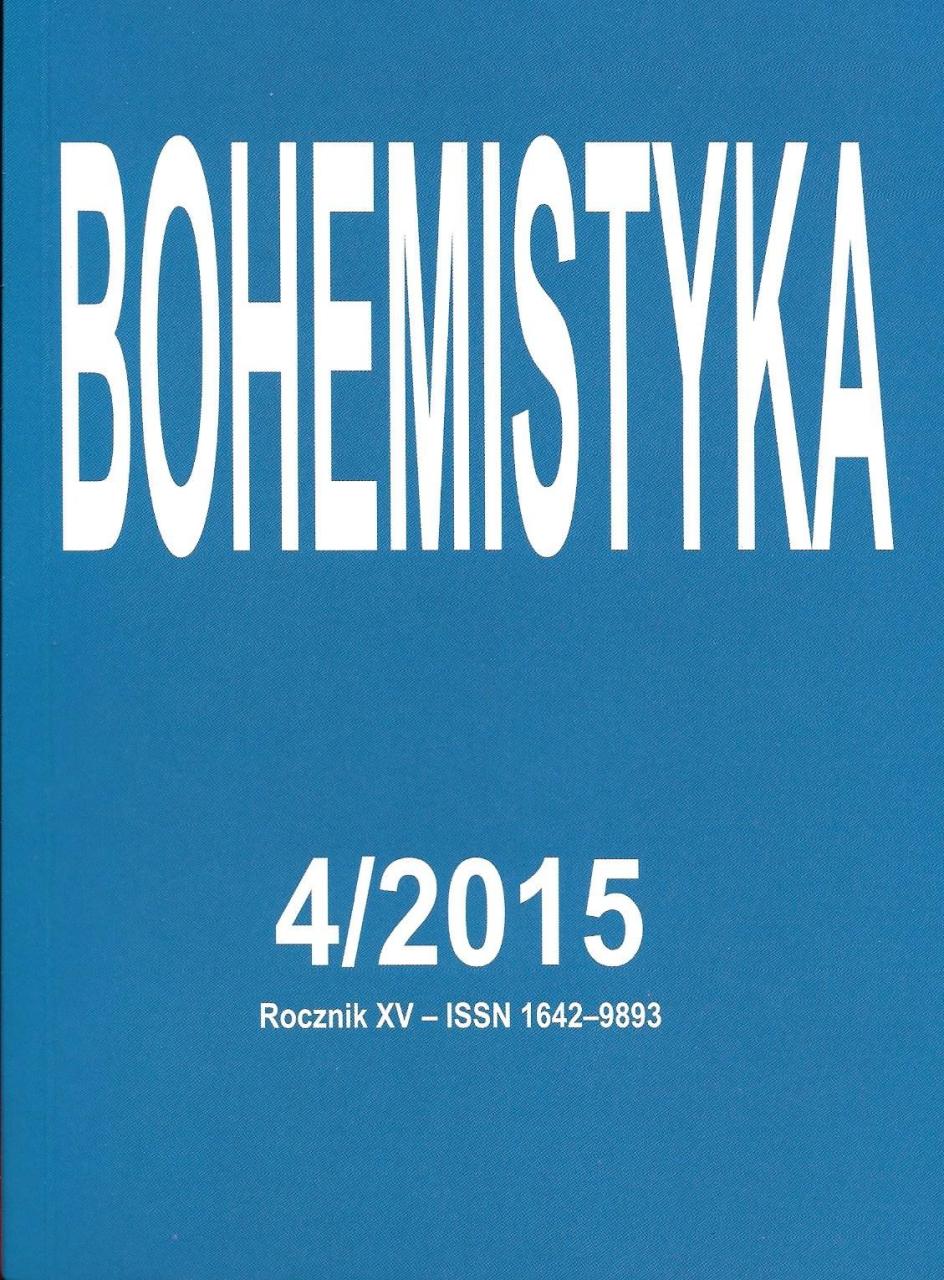
Wybrane stereotypy Czecha i Polaka z perspektywy historycznej
Author(s): Elżbieta Szczepanska / Language(s): Polish / Issue: 4/2015
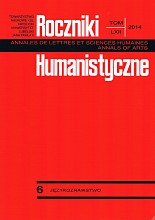
Wybrane typy gier słowotwórczych w tekstach Kabaretu Moralnego Niepokoju
Author(s): Magdalena Jurczyńska / Language(s): Polish / Issue: 06/2014
This paper attempts to explore word formation games in a cabaret text. The material under analysis was extracted from the sketches developed by Kabaret Moralnego Niepokoju [A Moral Anxiety Cabaret].The Article Presents a Classical of these Word Formation Muchanisms that can be used to Produce A Comic Effect. The Main Emphasis Is Put on these Mechanisms that rubelly rare in the same anlysses in the literature of the subject. These mechanisms include the following: grouping and accumulating of structures representing the same word formation pattern or lexemes belonging to one word formation family, emphatic use of a word formation structure, etymological reinterpretation, word play with the use of abbreviations and meta-word formation techniques . Neologisms and Contaminations Were Excluded from the Scope of the Analysis. The Analysis of the Data At Hand Revealed The Richness of Word Formation Strathegies that Cabaret Group Members Employ in Their Texts and Thesites of Functions rangies dress dresses The Major Function Used by the Cabaret Members Is Comical, Yet They Also Reach for Stylization and Enhanced Express of their Texts.
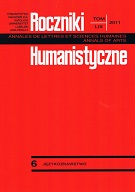
Wybrane Typy Komizmu Językowego W Tekstach Kabaretu Pod Wyrwigroszem
Author (s): Tomasz Korpysz, Olga Zając / Language (s): Polish / Issue: 06/2011
The Performances by Kabaret Pod Wyrwigroszem Representing The Series Entitled Między Bugiem a Prawdą Reveal a Variety of Mischanisms Language Humour. A lot of these mechanisms rely on the protagonists’ limited language competence and their use of dialect, as well as numerous cases of vocabulary misuse – words of Standard Polish are used by the protagonists with a violation of language norms. The Paper Presents Examples of Language Mechanisms that Arost Most Frequently for Comic Effects.
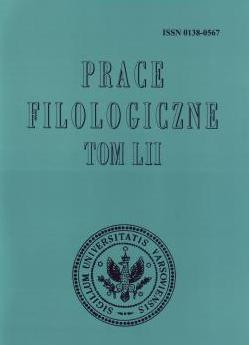
Wybrane właściwoś języka felietonów prasowych (Na Przykładzie Tygodnika „WPROST”)
Author (s): Magdalena Ostrowska / Language (s): Polish / Issue: 52/2007
The Article Presents The Trends in the Development of Contemporary Polish and Has Been Divated into Two Parts. In the first on the author focuses on the definition of the term ‘contemporary Polish Language’ and Presents Its Characteristic Features. SPECIAL Atting IS Paid to the Transition of Features Characteristic for Mass Culture Into the Language. The Second Part of the Paper IS Devited to Polish Written Texts. The Author Shows How the Previous Described Traitsh Language Function in Feature Articles.
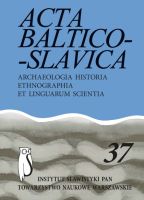
WYBRANE ZAGADNIENIA SKLEADNI Regionalnej W Polszczyźnie „Kuriera Wileńskiego” Z Lat 1924–1939
Author (s): Joanna Joachimiak-Prażanowska / Language (s): Polish / Issue: 37/2013
The Article Presents Issues of Choice in the Scope of Regional Syntax. These are characteristics The Most Characteristic for the Syntax of North and East Borderland. The Analysis of the Collected Syntax Characteristics Was Conducted by Means of “Kurier Wileński” Material. 48 Types of Specific Syntax Structures Were Excerpted from the Questioned Newspaper (29 of Them Were Chosen in this Article for Presentation). In „Kurier Wileński” one finds north Borderland syntax questions (ones the most often described in the literature of the subject), and several specific constructions functioning in the post-war Vilnius newspapers, however not registered earlier on the Borderland. The Text Frequency of the Structures Was Diverse. One noted the most often specific constructions with the preposition dla (127 certifications), and adjectival predicatives in ablative (111), as well as nominal sentences without copula (49), and the following structures: w Białorusi / do Białorusi (34), łTewska i estońska delegacje (28), chronić vzegoš (27), czekać czegoavy (22). However The Greatest Amount of Syntax Characteristics OcAssionally Ocurred in the Question Texts (1-2 certifications). As it was proved by the analysis, more than 70% of the syntax characteristics found in „Kurier Wileński” are the loan translations of Russian structures (at the same time nearly all the remaining constructions are based on Russian language). In the Subsequent Newspapers The Percentage of Russians was Even Higher. On these Grounds The North Borderland Syntax Was and is Highly Russiaacified.
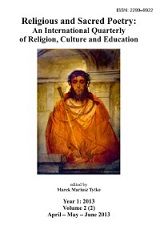
Wychowanie chrześcijańskie dzieci i młodzieży
Author (s): Ewa kopeć / Language (s): Polish / Issue: 2/2013
Upbringing Is a Process Which Has The Greatest Influence Upon The Correct Formulation of a Child Personality. It is One of the Most Important Notions in Pedagogy. A specific Place in understanding the goal of upbringing is taken by the Catholic Concept of Education. IS BecAuse Christianity is a Religion Revealed by God Disclosing Himself as a Person Full of Love. The Purpose of Christian Upbringing/Education, Which is a Continuation of God's Pedagogy, Expressed in Human Interaction with God's Grace, is to form a perfect man, and the CHREST Man, and the CHRUSTANHISTAN.Reflection concerning the phrase Christian education is associated with the study of the values that/which should be introduced in the field of education and preparing young people for life in the spirit of religion. The essential role in these activities was played by moral education. Today we do not observe a shortage of those among the youth in Poland and all over the world, who would be sensitive to spiritual values and look for help and support in the process of maturation of their Christian personality. A great role in this process belongs to the participation and work for the church choir, which offers a musical frame for various religious ceremonies, especially the Mass.
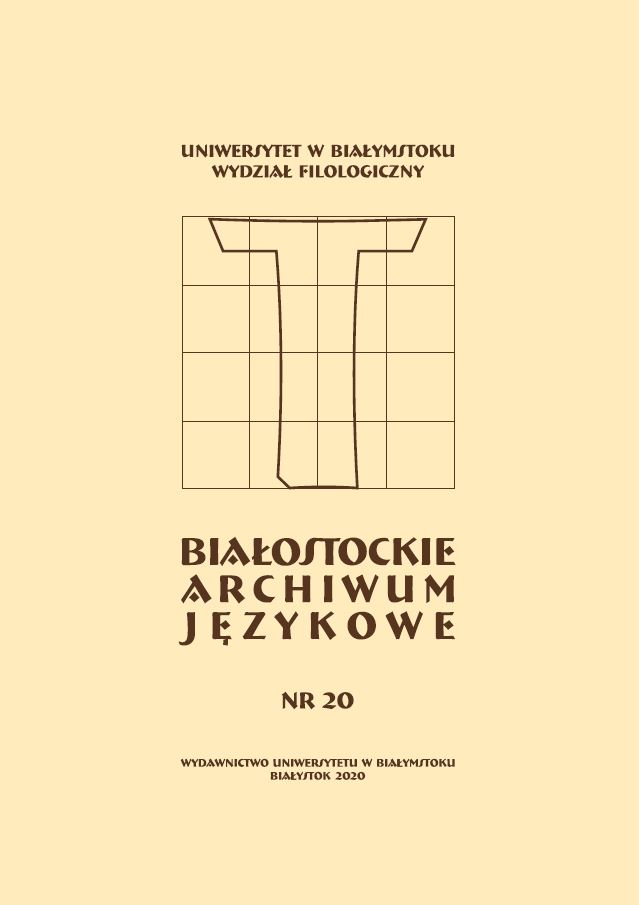
Wychowanie przez słownik
Author(s): Malgorzata Nowak / Language(s): Polish / Issue: 20/2020
This article contains deliberations on the pedagogical dimension of Ilustrowany słownik katechetyczny (ISK) by Beata Boguszewska addressed to children of early school age, their parents and catechists. In an analysis of source, categories indicated in that context by Bogusław Nowowiejski, i.e. pure theory of law, encyclopaedic learning, educational character and persuasiveness, were used as verifiers of pedagogical dimension of the lexicon. Despite the fact that ISK had all the above mentioned properties, in the pedagogical aspect mainly open persuasiveness and educational character have become active. A high degree of persuasiveness of the ISK, compliant with the objectives of the dictionary in abstracto intended for children and youth, should be treated as its characteristic feature.
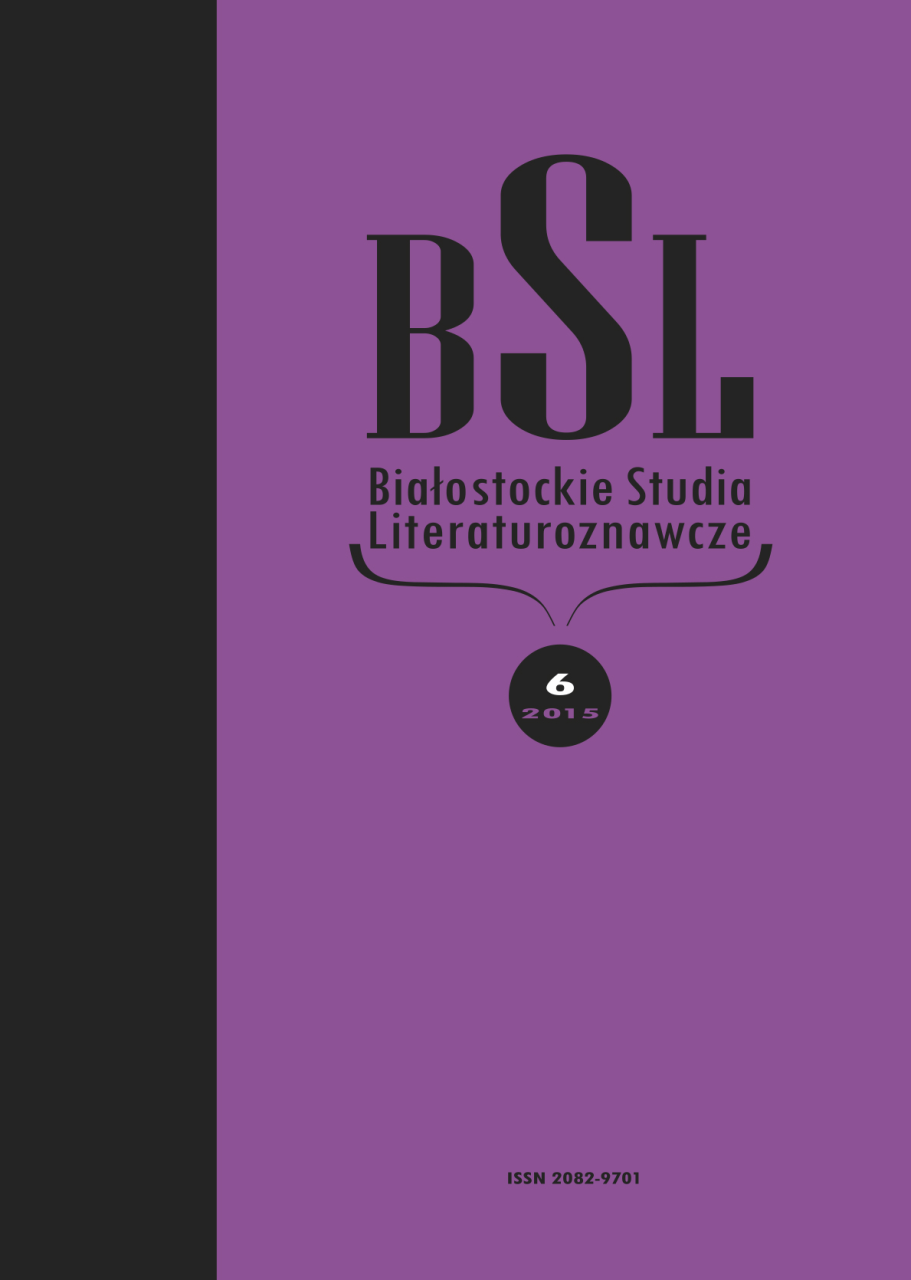
Wycieczka w góry/podróż do wnętrza ziemi. Przestrzeń tatrzańska w Kosmosie Witolda Gombrowicza
Author(s): Lukasz Wrobel / Language(s): Polish / Issue: 06/2015
The article indicates how the mountainous space is articulated in Cosmos in its “logical-underground” manner. The gradual occurrence of random improbabilities permeates the novel. In addition, the book reveals marked differences in how tangible matter is represented in its first part (the guest house events) and in its description of the Tatras. Eventually, the journey of the living protagonists ends under the mass of inanimate matter, thus obliterating the cohesion of the human and animal world, and even of corporeality as such. This is how the human polarity – the improbable – demonstrates itself and how it multiplies indefinitely.
About
CEEOL is a leading provider of academic e-journals and e-books in the Humanities and Social Sciences from and about Central and Eastern Europe. In the rapidly changing digital sphere CEEOL is a reliable source of adjusting expertise trusted by scholars, publishers and librarians. Currently, over 1000 publishers entrust CEEOL with their high-quality journals and e-books. CEEOL provides scholars, researchers and students with access to a wide range of academic content in a constantly growing, dynamic repository. Currently, CEEOL covers more than 2000 journals and 690.000 articles, over 4500 ebooks and 6000 gray literature document. CEEOL offers various services to subscribing institutions and their patrons to make access to its content as easy as possible. Furthermore, CEEOL allows publishers to reach new audiences and promote the scientific achievements of the Eastern European scientific community to a broader readership. Un-affiliated scholars have the possibility to access the repository by creating their personal user account

